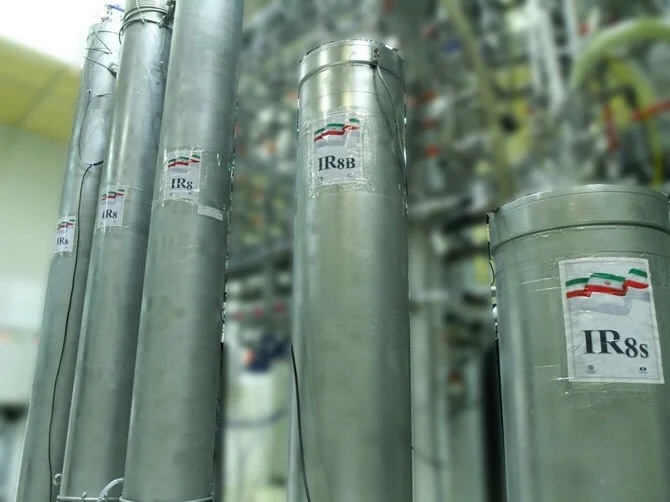
Why Tehran wants the nuclear deal restored
The atomic enrichment facilities Natanz nuclear research center, some 300 kilometres south of Tehran, can be seen. (File/AFP)
Now that the electoral college has affirmed Joe Biden’s election as the next US President, the White House is probably going to resurrect the Joint Comprehensive Plan of Action (JCPOA), commonly called the Iran nuclear deal.
As Biden made clear in an opinion piece for CNN: “I will offer Tehran a credible path back to diplomacy. If Iran returns to strict compliance with the nuclear deal, the United States would rejoin the agreement as a starting point for follow-on negotiations. With our allies, we will work to strengthen and extend the nuclear deal’s provisions, while also addressing other issues of concern.”
A few days after Gen. Qassem Soleimani was killed in January, President Hassan Rouhani said Iran was pulling out of the nuclear deal. Currently Iran is violating all the restrictions of the JCPOA, according to the International Atomic Energy Agency (IAEA). Tehran has increased its total stockpile of low-enriched uranium from 1,020.9kg to 1,571.6kg, about eight times what the regime was allowed to maintain under the nuclear deal. According to the terms of the JCPOA, Iran was permitted to keep a stockpile of 202.8kg, and enrich uranium up to 3.67 percent. It is now enriching uranium to a purity of 4.5 percent and possesses far more heavy water than permitted under the nuclear agreement. Moreover, according to the IAEA report, Iran is not allowing the IAEA to inspect its sites.
Approximately 1,000kg of uranium enriched to just 5 percent can be further refined to create one nuclear bomb. This means that the Iranian regime now has enough enriched uranium to refine and build a nuclear bomb if it desires to do so.
In spite of all these violations, the theocratic establishment is more than eager to rejoin the nuclear deal. The Iranian president recently announced that Tehran would return to the agreement an hour after the US rejoins it. Foreign Minister Mohammad Javad Zarif said much the same in November. It follows that Supreme Leader Ali Khamenei is probably on board, since the president and foreign minister would have not signaled their willingness to rejoin the deal without permission from the man who enjoys the final say in Tehran’s foreign and domestic policies.
Iran is more than willing to rejoin the nuclear deal mainly due to the boost that it will bring to the regime’s economy and finances.
Dr. Majid Rafizadeh
In fact, Iran is desperate to revive the 2015 nuclear deal. First, it gives a significant financial boost to the regime. Tehran can ramp up its oil exports substantially. The Iranian authorities are already preparing installations to export oil at full capacity within months. According to Rouhani’s official website, he has told the oil ministry “to prepare resources and oil-industry equipment for the production and export of oil in line with current capacity within the next three months.”
Before Donald Trump pulled the US out of the nuclear deal and began the maximum pressure policy against the Iranian regime, Tehran was exporting more than 2 millions barrels of oil per day. In the past two years, Iran’s oil exports have been as low as 100,000 barrels a day. The regime heavily relies on oil revenues to run the government. As the president admitted recently: “Without money, we cannot run the affairs of the state. Although we have some other income, the only revenue that can keep the country going is the oil money.”
Second, the nuclear deal will open the road for the West to invest in Iran’s sectors and the Iranian leaders desire foreign investment. After the nuclear deal was signed in 2015, Iranian leaders even invited American oil companies to do business Iran.
This suggests that the Islamic Republic is willing to put its economic interests ahead of its revolutionary ideological interests. In return, the economic profits will definitely help the regime export and spread its revolutionary ideologies and principles in the region.
Third, rejoining the nuclear deal will provide global legitimacy for Iran. This means that its support for militia groups and its military adventurism and destructive behavior in the Middle East is more likely to be tolerated or ignored by world powers.
In a nutshell, Iran is more than willing to rejoin the nuclear deal mainly due to the boost that it will bring to the regime’s economy and finances.
• Dr. Majid Rafizadeh is a Harvard-educated Iranian-American political scientist. He is a leading expert on Iran and US foreign policy, a businessman and president of the International American Council. He serves on the boards of the Harvard International Review, the Harvard International Relations Council and the US-Middle East Chamber for Commerce and Business. Twitter: @Dr_Rafizadeh
Disclaimer: Views expressed by writers in this section are their own and do not necessarily reflect Arab News’ point-of-view
No comments:
Post a Comment